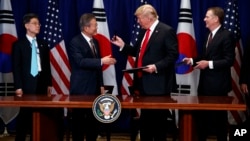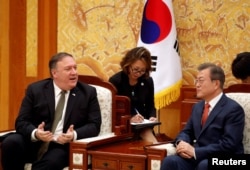Lee Ju-hyun contributed to this report.
SEOUL-- South Korean President Moon Jae-in heads for Washington Wednesday, where he will meet with U.S. President Donald Trump on Thursday. Moon said previously he hoped his trip to the United States will revitalize stalled talks with North Korea that collapsed after Trump and North Korean leader Kim Jong Un failed to reach an agreement during their February summit in Hanoi.
Harry Kazianis, director of Korean Studies at the Center of the National Interest, told VOA Moon’s Washington trip serves two purposes.
First, Kazianis said, Moon “wants to make sure that the talks [between Pyongyang and Washington] continue.”
He said the “bare minimum” Moon needs to accomplish during his trip is “to keep both sides sort of engaged” and “smooth over” any rough patches.
“I think what he's really going to try and do is to see if both parties can split the difference,” said Kazianis.
That’s something that may be possible. Speaking last week on the televised news program CBS This Morning, U.S. Secretary of State Mike Pompeo said diplomatic channels remained open and there had been ongoing “conversations after Hanoi about how to move forward.”
In addition, Pompeo said he was "confident" there would be a third summit between the two leaders, possibly in the coming months; however, he gave no details.
Cheon Seong Whon, a visiting research fellow at The Asan Institute for Policy Studies, was not as optimistic about fruitful discussions with Pyongyang.
“[The United States] cannot dampen the mood on talks; therefore the emphasis on [Pompeo’s] positive remarks,” said Cheon. “I do not think they are seriously considering that North Korea will give up their nukes [because] North Korea has never said that they will stop nuclear and missile development.”
Sanctions relief
South Korean President Moon Jae-in has advocated for inter-Korean projects as a way to further peace on the Korean peninsula. These efforts include reopening the joint industrial complex in Kaesong and resuming tours at Mount Kumgang, but doing so would run afoul of international sanctions.
Pompeo said economic sanctions on North Korea would not be lifted until Pyongyang abandoned its nuclear weapons; nevertheless, local South Korean media reports that Moon will propose easing sanctions on North Korea when he meets with President Trump.
“Kim is obviously not going to fully denuclearize right away,” said Kazianis, noting that the United States would probably not drop its sanctions against North Korea if Kim made a “small move.”
Therefore, Kazianis envisions a situation where the United States would temporarily drop sanctions if North Korea would completely abandon the Yongbyon nuclear facility.
“That allows both sides to continue on in the process, and I think that's something Moon can do,” he said.
Cheon is unsure an easing of sanctions will bring about the desired results on the peninsula.
“From 1991, when the North Korean nuclear issue began, to the current sanction, the [South] Korean and U.S. governments have participated” in a repetitive cycle, he said.
Seoul and Washington have attempted to create a “virtuous cycle” where incentives were given to North Korea in exchange for a decrease in threatening behavior, said Cheon, calling the practice a “historically proven failure.”
Unlike Presidents Trump and Moon, Kim Jong Un can “wait things out” since the United States and South Korea have fixed terms for their leaders, Kazianis asserted.
“So if Trump and Moon are serious [about negotiating with Kim about denuclearization], they're going to have to put their best package together pretty soon, then I think we're going to be able to find out if Kim is serious,” he said.
Kazianis added, “If that's not the case, then we're going to have to move to probably tougher position.”
That’s something that may be necessary said Cheon.
“North Korea is proposing a ‘nuclear-free zone of the Korean peninsula,’” he said. It’s a concept first introduced by Kim Il Sung 30 years ago.
Cheon explained that North Korea is seeking to remove South Korea from the United States’ nuclear umbrella, prohibit the deployment of nuclear weapons on the Korean peninsula, withdraw U.S. forces, and prohibit the deployment of strategic assets.
“South Korea and the U.S. should establish their positions and develop a stable alliance to ensure North Korea gives up its nuclear weapons,” urged Cheon.
South Korean President Moon Jae-in departed Seoul April 10 and meets in Washington with U.S. President Donald Trump, Thursday, April 11.






